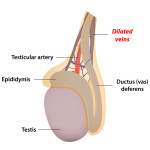 A varicocele is a mass of swollen and enlarged veins in the scrotum. It’s usually painless and is fairly common, especially in young men between the ages of 15 and 25. Although most small varicoceles don’t cause problems, larger varicoceles can cause pain. Read on to learn more about this common condition.
A varicocele is a mass of swollen and enlarged veins in the scrotum. It’s usually painless and is fairly common, especially in young men between the ages of 15 and 25. Although most small varicoceles don’t cause problems, larger varicoceles can cause pain. Read on to learn more about this common condition.
What causes varicoceles?
A part of the body called the spermatic cord provides a connection to the testicles, and has arteries, tubes, veins, and nerves in it. Normally, the valves in the veins keep the blood flowing in the right direction from the lower body to the heart. However, sometimes the valves don’t work correctly, and the blood backs up. When this happens, the veins stretch and swell up. These swollen veins are called a varicocele. Varicoceles are most commonly found in the left scrotum.
How would my son know if he has varicocele?
Because varicoceles are usually painless, many young men don’t even realize that they have one until they go to their health care provider (HCP) for an annual check-up.
You may want to encourage your son to perform regular testicular self-exams. This way he will notice any changes in his testicles, including signs of varicoceles, which include:
- Swollen veins in the scrotum that feel kind of like worms
- A heavy, uncomfortable, or dull aching feeling in the scrotum
- One testicle is larger than the other
- A painless testicular lump or
- Pain in one or both testicles–some young men feel pain when standing up which improves when they lay down
What should my son do if he thinks he has a varicocele?
If your son has any of these signs or symptoms, or has any questions after performing a testicular self-exam, it’s important for him to see his HCP. If he’s reluctant to make an appointment, assure him that even though it might seem a little embarrassing, health care providers are trained professionals who see varicoceles often.
How does a medical provider diagnose a varicocele?
To diagnose a varicocele, your son’s HCP will take a look at his groin and perform a physical exam. The HCP will check the area around his testicles for lumps, swelling, or tenderness.
Will a varicocele cause problems for my son?
It’s not likely that a varicocele will be harmful to your son, as most small varicoceles don’t cause any problems. However, some varicoceles cause pain, some may affect testicular growth, and some may cause fertility problems.
What is the treatment for a varicocele?
If your son has no pain and his testicles are growing normally, it’s likely that his HCP may recommend coming back annually for a check-up.
If he does have pain or swelling, his HCP may prescribe an over-the-counter pain reliever such as ibuprofen or acetaminophen/tylenol. He/she may also advise him to wear snug fitting underwear or a jock strap for support and will likely monitor the size of his testicles to make sure there are no problems. If a significant difference in his testicles is detected, your son’s HCP may recommend an ultrasound or an appointment with a urologist.
Most varicoceles do not cause any problems. However, sometimes a simple outpatient surgical procedure called a varicocelectomy to correct the varicocele is recommended. This procedure is done to stop blood from spilling into the swollen vein(s) and involves making a small incision and removing only the veins that are causing a problem.
Even though most varicoceles don’t cause problems, it’s still important to have your son see his HCP for an annual check-up. He should also see his provider any time he’s worried about a lump or change in his testicles.
 Young Men's Health
Young Men's Health